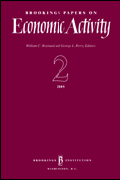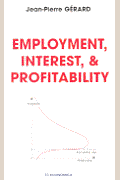Studies in this week’s Hutchins Roundup find the stock market has become less representative of the economy in recent decades, increasing corporate taxes may further concentrate income at the top of the income distribution, and more.
Want to receive the Hutchins Roundup as an email? Sign up here to get it in your inbox every Thursday.
Stock market is less representative of the economy than it was in the 1970s
The stock market has been strong amid the COVID-19 pandemic, but how representative is the stock market of the broader economy? Not as much as it used to be, say Frederik P. Schlingemann of the University of Pittsburgh and René M. Stulz of Ohio State. Using accounting data and stock prices, they find that publicly traded firms accounted for 41% of the U.S.’s total non-farm payroll employment in 1973, but just 29% in 2019. Publicly traded firms’ contribution to GDP has also trended down in recent decades, they find, and the gap between each firm’s market capitalization and its contribution to U.S. employment and GDP has widened. The authors argue that these results reflect the decline of manufacturing in the U.S. Firms in the industrial and manufacturing sector require more financial capital than the service industry, making them more likely to be publicly listed. However, in the last several decades the U.S. economy has seen a sharp decrease in industrial and manufacturing sector employment and an increase in service industry employment.
Corporate tax hikes can lead to further concentration of income
Raising corporate tax rates, often proposed as a way to reduce income inequality, may actually do the reverse, says James R. Hines Jr. of the University of Michigan. Higher corporate taxes do reduce the average return to capital (disproportionately held by those at the top), but it also may concentrate realized income amongst the wealthiest individuals. Using data from 2014-2017, the author finds that at least half of the distributional effect of corporate tax increases is reversed by shifts in business type. He notes that raising corporate tax rates leads individuals to instead open unincorporated businesses. Because ownership of unincorporated businesses is small and therefore undiversified, owners and investors bear higher levels of risk which can lead to extreme results: unincorporated businesses tend to be either very successful or lose significant portions of investments. Consequently, growth of unincorporated businesses results in more people becoming wealthy or economically unsuccessful. Indeed, the author finds that tax returns show the top 1% of the income distribution disproportionately realizing substantial business gains and small business losses. He concludes that, were all businesses in the U.S. publicly traded corporations, income inequality would be much smaller today.
Income losses, not unemployment, lead to declines in family wellbeing
The COVID-19 pandemic presents a unique combination of economic and social hardships to families, particularly those with young children. In a survey of almost 600 low-income parents of preschoolers in Chicago, Ariel Kalil, Susan Mayer and Rohen Shah of the University of Chicago examine how parent-child relationships have been affected by financial shocks, like job and income loss, versus social shocks, including COVID-19 exposure and increased time with children. They find that there are fewer positive interactions between parents and children and more behavioral problems in households in which someone has COVID, but more positive interactions when time spent with children increases because of school closures. Notably, while income losses from unemployment are strongly associated with a decline in parents’ mental health and a deterioration in the quality of parent-child relationships, none of the households that experienced job losses but no subsequent income loss (whether due to federal stimulus payments or increased income from other householders) experienced these negative effects. These results highlight the importance of both income stability and time spent with children to family dynamics, the authors argue, suggesting that policies like paid family leave and generous unemployment insurance can play an important and positive role in children’s development.
Chart of the week: Monthly Chapter 11 Bankruptcy Filings are Rising during COVID-19
 Chart courtesy of Arbor Research & Trading; Monthly commercial bankruptcy statistics from the American Bankruptcy Institute
Chart courtesy of Arbor Research & Trading; Monthly commercial bankruptcy statistics from the American Bankruptcy Institute
Quote of the week:
“As a result of eased lockdowns and the rapid deployment of policy support at an unprecedented scale by central banks and governments around the world, the global economy is coming back from the depths of its collapse in the first half of this year. Employment has partially rebounded after having plummeted during the peak of the crisis,” says Gita Gopinath, Economic Counsellor and Director of the Research Department at the International Monetary Fund.
“This crisis is however far from over. Employment remains well below pre-pandemic levels and the labor market has become more polarized with low-income workers, youth, and women being harder hit. The poor are getting poorer with close to 90 million people expected to fall into extreme deprivation this year. The ascent out of this calamity is likely to be long, uneven, and highly uncertain. It is essential that fiscal and monetary policy support are not prematurely withdrawn, as best possible.”
“This is the worst crisis since the Great Depression, and it will take significant innovation on the policy front, at both the national and international levels to recover from this calamity. The challenges are daunting. But there are reasons to be hopeful. The exceptional policy response…and the use of digital technologies to deliver social assistance are a powerful reminder that well-designed policies protect people and collective economic wellbeing.”









Commentary
Hutchins Roundup: Stock market, corporate taxes, and more
October 15, 2020